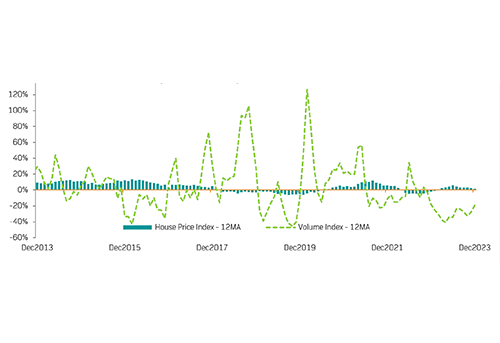The FNB House Price Index during the last 12 months indicates an average growth of 1.5% at the end of Q4 2023, compared to a growth of 3.3% at the end of Q3 2023 and -1.9% at the end of Q4 2022. The growth rates for the small, medium, large and luxury segments stood at 0.7%, -1.4%, 7.3% and 24.9%, respectively.
Compiled by FNB economist Ruusa Nandago, the index also indicates that from a regional perspective, the coastal region once again recorded the strongest growth of 8.8%, while the central, northern and southern regions recorded growth rates of -2.5%, -0.2% and 6.1%, respectively.
The overall national house price now stands at N$1 214 674 during Q4 2023, slightly lower than N$1 218 086 in Q3 2023, but higher than N$1 196 569 over the corresponding period in 2022. The average prices for the central, coastal, northern and southern regions stand at N$1 550 000, N$1 398 000, N$864 000 and N$881 000, respectively.
Transaction volumes remain contractionary for the sixth consecutive quarter, at a 12-month average growth of -19.1% at the end of Q4 2023, from –27.7% in Q3 2023 and -17.9% in Q4 2022. The contraction in volumes was once again broad-based across all four regions. From a segment perspective, the contraction was observed in the small (-29.5%) and medium (-31.3%) segments, while the large and luxury segments recorded a 20.0% and 0.0% growth rate, respectively. This signals that buying activity in the residential property market remains broadly subdued across the board.
“The subdued buying activity is aligned to the elevated interest rate and inflation environment, which has weighed on consumer health in the context of high levels of indebtedness among households which currently stands at 86.%. This limits the ability for consumers to spend on assets such as housing as the focus is on supplementing disposable income, which has come under pressure in the prevailing environment. This view is corroborated by private sector credit extension numbers, which show that household mortgage credit grew by 3% on 12-month rolling average basis in Q4-2023 compared to unsecured credit which grew by 11.1% over the same period,” Nandago stated.
“We maintain our view that inflation will moderate but remain sticky, that the repo rate has peaked at 7.75%, and the cutting cycle will commence in the latter half of 2024. With rising default rates observed, we continue to expect buying activity to remain constrained over the remainder of 2024 and the first half of 2025, as the cutting cycle will be too shallow to induce a significant rebound in the residential property market,” Nandago added.
Meanwhile, FNB said the residential property sector continues to bear the brunt of the elevated price and interest rate environment, as observed in weak buying activity across all regions.
“We maintain our view that the residential property market will remain constrained as affordability bottlenecks persist. We take note of a potential upside that could result from the adjustments in LTV (loan to value) ratios and the impact of oil, gas and renewable energy activity at the coast. Furthermore, we note that the recent national budget allocated N$700 million for the upgrading of informal settlements, land servicing and provision for housing allocated in FY2024/25, which bodes well for the housing sector. To further stimulate housing activity from a policy perspective, the brackets for transfer and stamp duties have been adjusted for inflation, and the exemption level has been increased from N$600 000 to N$1 100 000 to improve access to housing,” Nandago added.
“We maintain our view that supply-side issues remain a binding constraint on buying activity in the residential property market. An increase in the supply of serviced land and consequently housing stock is crucial for the growth of the residential property market,” she stated.


